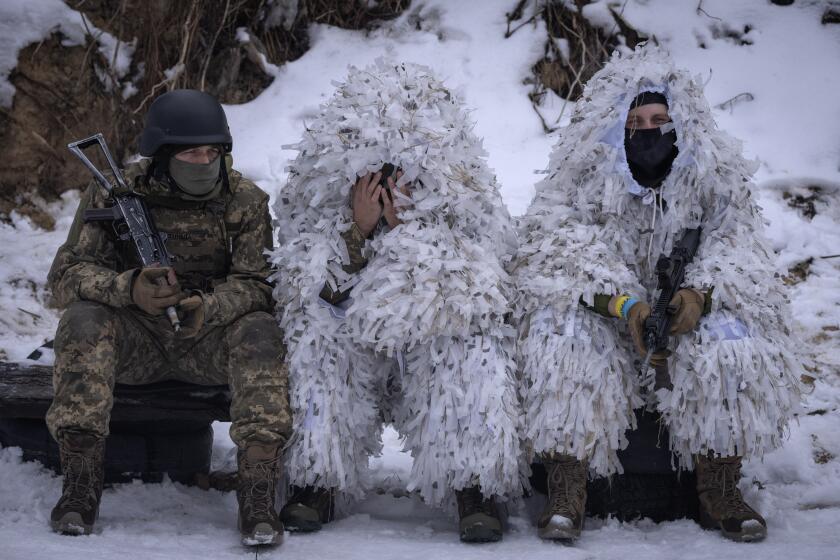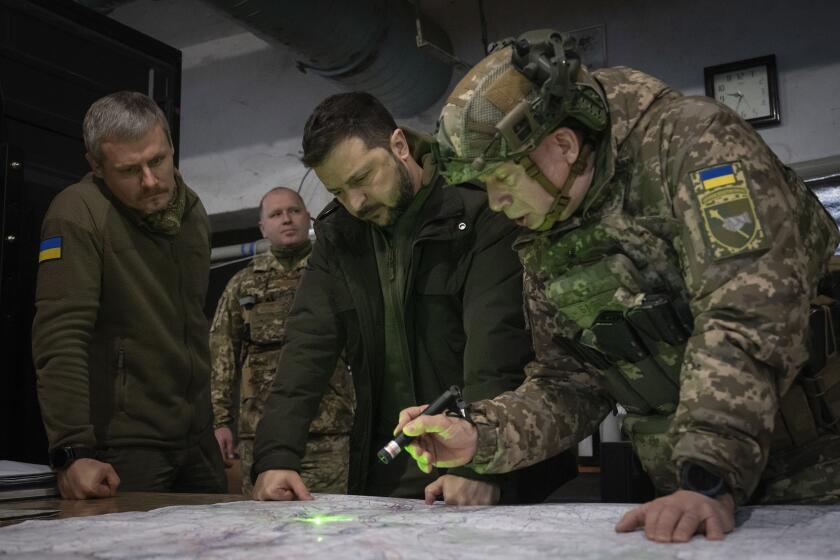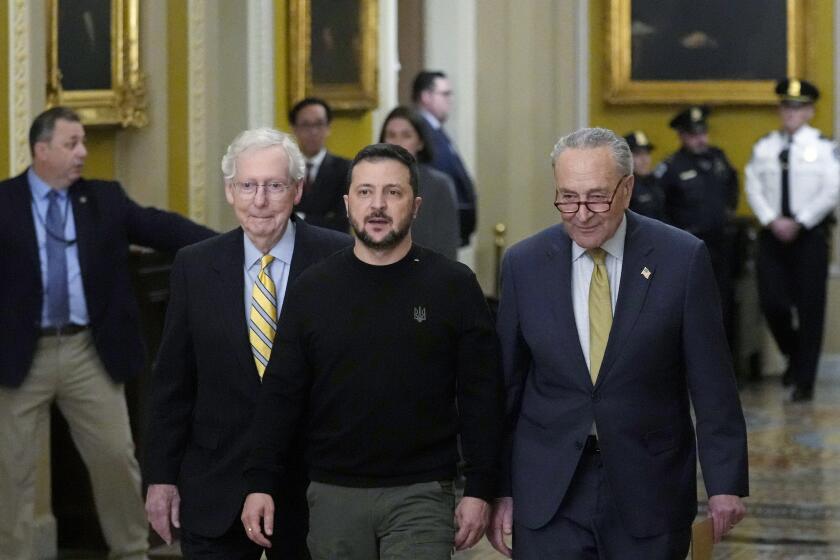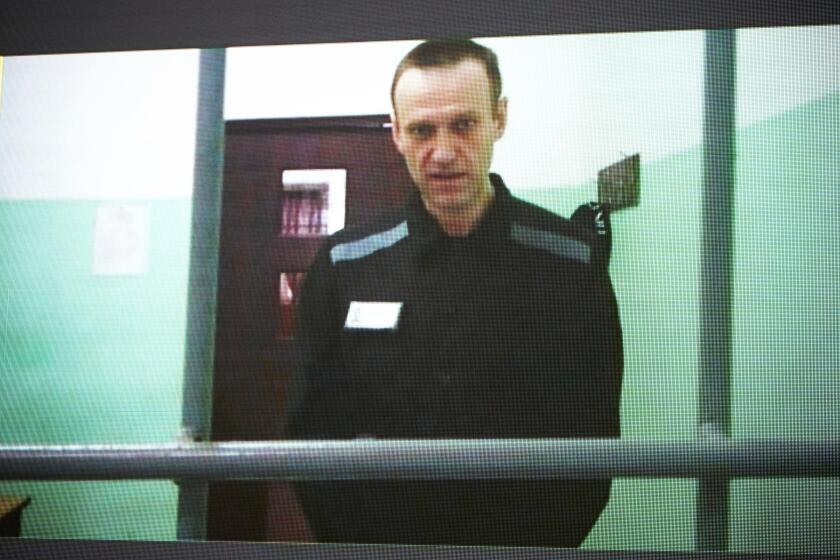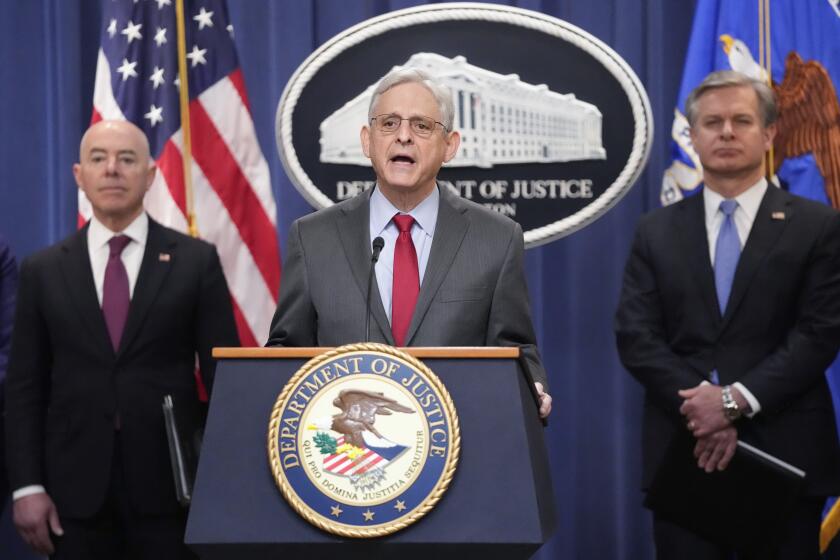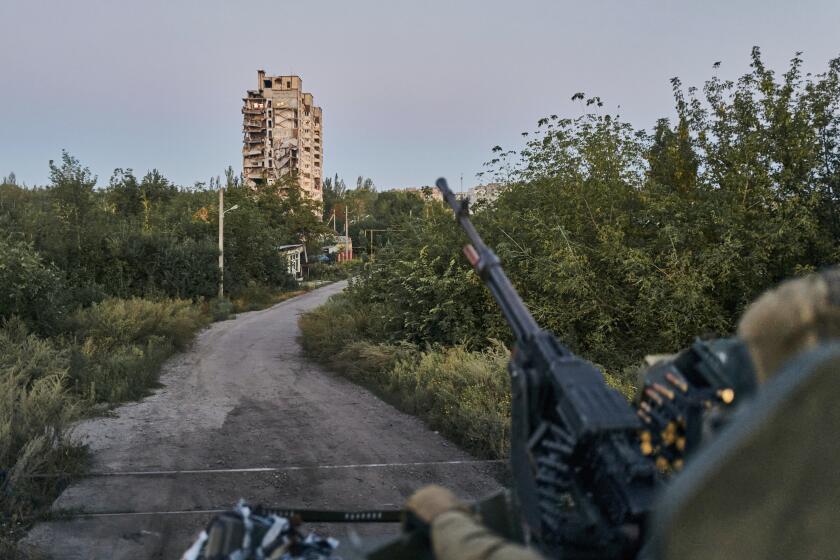Putin insists there will be no peace in Ukraine until his goals are achieved
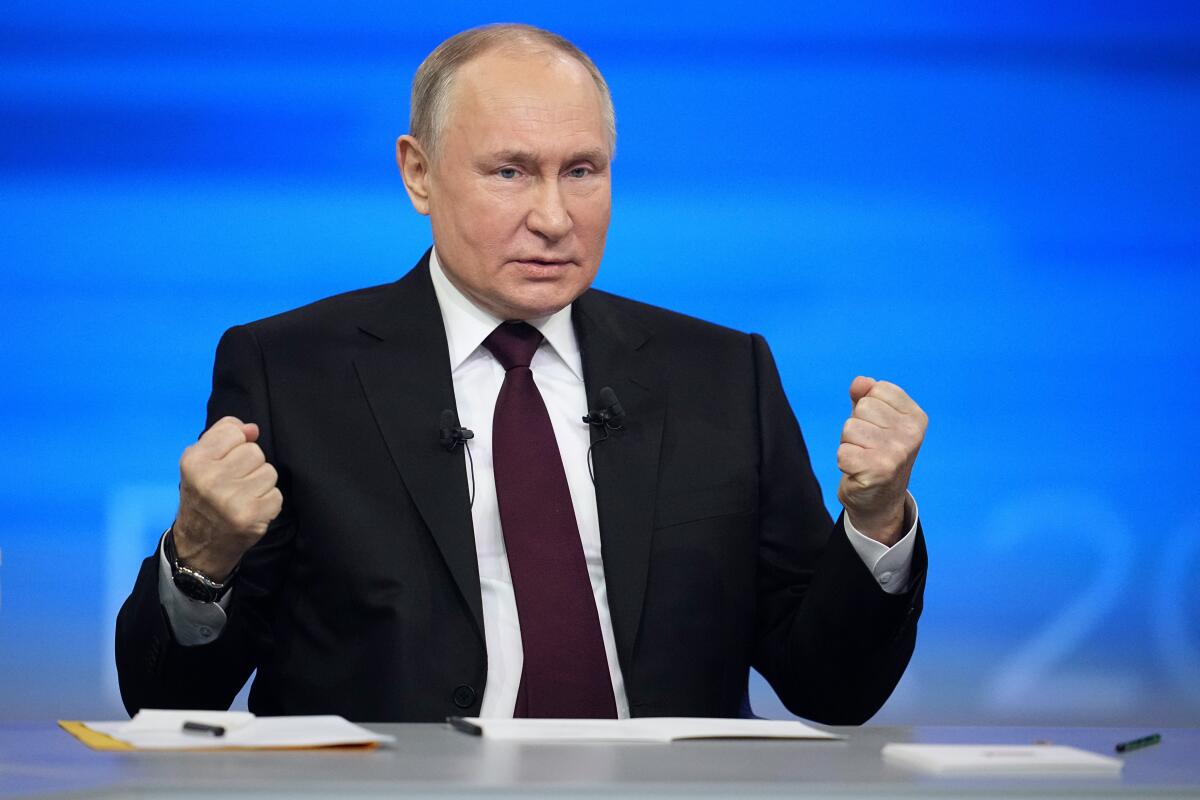
- Share via
MOSCOW — Russian President Vladimir Putin said Thursday that there would be no peace in Ukraine until the Kremlin realizes its goals, which remain unchanged after nearly two years of fighting that has sent tensions soaring between Moscow and the West.
Speaking at a year-end news conference that lasted more than four hours and offered him an opportunity to reinforce his grip on power, Putin gave some rare details on what Moscow calls its “special military operation.”
He dismissed the need for a second wave of mobilization of reservists, saying at a year-end news conference that there are some 617,000 Russian troops currently in Ukraine, including around 244,000 soldiers who were called up to fight alongside professional Russian military forces.
“There will be peace when we will achieve our goals,” Putin said, repeating a frequent Kremlin line. “Victory will be ours.”
Putin highlighted Russian military gains in Ukraine as the conflict’s second winter approached.
“Almost all along the line of contact our armed forces, let’s put it modestly, are improving their positions, almost all in an active stage of action, and there is an improvement in the position of our troops all along,” he said.
The Siberian Battalion is an unusual unit of the Ukrainian military made up of Russian nationals who have joined to fight against their own homeland.
“The enemy has declared a big counteroffensive, but he hasn’t achieved anything anywhere,” Putin added, claiming that the latest Ukrainian attempt to create a bridgehead on the eastern bank of the Dnipro River had fizzled and that Ukrainian troops suffered heavy losses.
He alleged that Kyiv was sacrificing its troops in order to show some success to its Western sponsors as it seeks more aid.
“I believe it’s stupid and irresponsible on behalf of the country’s political leadership, but it’s their business,” he said.
Putin, who has held power for nearly 24 years and announced last week he is running for reelection, was greeted with applause as he arrived in the hall in central Moscow. He did not hold his traditional news conference last year after his military failed to take Kyiv and as the Ukrainian army recaptured swaths of territory in the east and south of the country.
Ukrainian President Volodymyr Zelensky says the war with Russia is in a new stage, with winter expected to complicate fighting after a summer counteroffensive that failed to produce desired results due to enduring shortages of weapons and ground forces
But with Ukrainian President Volodymyr Zelensky pleading for more U.S aid, a stalling counteroffensive and reports of fracturing Western support for Ukraine, Putin decided to face the media once more — though the broadcast remained heavily choreographed and more about spectacle than scrutiny.
This year, ordinary citizens had the chance to phone in questions along with those asked by journalists; Russians also submitted questions over the last two weeks.
The news conference opened with questions about the conflict in Ukraine and highlighted concerns some Russians have about fears of another wave of mobilization.
“There is no need” for mobilization now, Putin said, because 1,500 men are being recruited into the Russian army every day across the country. He said that, as of Wednesday evening, 486,000 soldiers have signed a contract with the Russian military.
Ukraine came under attack from the air and from cyberspace as projectiles rained down on a southern region and hackers knocked out cellphone service.
His remarks about another mobilization were met with skepticism by some independent Russian media, which noted that he had originally promised not to draft reservists for Ukraine and then reversed course and ordered a “partial” call-up. The move, which he announced in September 2022, prompted thousands of Russians to flee the country.
Putin reiterated that Moscow’s goals in Ukraine — “de-Nazification, de-militarization and a neutral status” of Ukraine — remain unchanged. He spelled out those objectives the day he sent troops to the country in February 2022.
“De-Nazification” refers to Russia’s allegations that the Ukrainian government is heavily influenced by radical nationalist and neo-Nazi groups — claims derided by Kyiv and the West. Zelensky, Ukraine’s president, is Jewish.
Putin has also demanded that Ukraine remain neutral — and not join the NATO alliance.
An ally of imprisoned Russian dissident Alexei Navalny says the Kremlin is probably trying to deepen his isolation ahead of an election in March.
He reaffirmed his claim that much of today’s Ukraine, including the Black Sea port of Odesa and other coastal areas, historically belonged to Russia and were given away by Soviet Union founder Vladimir Lenin.
While Moscow had accepted the new reality after the USSR’s collapse in 1991, Putin said he was forced to respond to what he described as an attempt by the West to turn Ukraine into a tool to challenge and threaten Russia.
“Russians and Ukrainians are one people, and what’s going on now is a huge tragedy, a civil war between brothers who have found themselves on the opposite sides,” he added.
Putin’s last news conference was in 2021 as the U.S warned that Russia was about to send troops into Ukraine. He delayed an annual state-of-the-nation address until February 2023.
The Justice Department files war crime charges against four members of the Russian military accused of abducting and torturing an American in Ukraine.
Relations with the U.S. since then have plunged to new lows as the conflict continued.
On the Israeli-Hamas war, Putin again deplored the death of thousands of women and children in Gaza, citing United Nations Secretary-General Antonio Guterres, who called it a “graveyard for children.”
Putin urged stronger efforts to protect civilians and urged greater humanitarian aid, adding that Russia proposed setting up a field hospital in Gaza near the border with Egypt but Israel responded that it would be unsafe. He reaffirmed a call for implementing a U.N. resolution on the creation of a Palestinian state with East Jerusalem as its capital.
Putin appeared calm and relaxed during questions, although he frequently cleared his throat, blaming the air conditioning. The event is primarily aimed at a domestic audience and is a chance for him to appear personally involved in resolving the problems of ordinary Russians and reinforce his authority ahead of the March 17 election.
Breaking News
Get breaking news, investigations, analysis and more signature journalism from the Los Angeles Times in your inbox.
You may occasionally receive promotional content from the Los Angeles Times.
Responding to a final question about what kind of warning he would have given to himself from today’s perspective when he started his first term in 2000, Putin said he would have warned against “naivete and excessive trustfulness regarding our so-called partners.”
Putin also fielded questions from a group of children in Russian-annexed Crimea concerned about the leaking roof and mold in their gymnasium and a woman who, addressing “my favorite president,” complained about the spiking price of eggs.
“I regret and apologize about that — a glitch in the work of the government,” Putin said, explaining that egg production had not matched demand and blaming the government for not increasing imports quickly enough.
Although the event is tightly controlled, some online questions that Putin ignored appeared on screens in the hall.
Ukrainian officials have launched an investigation into allegations that Russian forces killed surrendering Ukrainian soldiers.
“Mr. President, when will the real Russia be the same as the one on TV?” one text message said, apparently referring to the Kremlin’s control over the media, which portray Putin positively and gloss over the country’s problems.
Another read: “I’d like to know, when will our president pay attention to his own country? We’ve got no education, no healthcare. The abyss lies ahead.”
More to Read
Sign up for Essential California
The most important California stories and recommendations in your inbox every morning.
You may occasionally receive promotional content from the Los Angeles Times.
